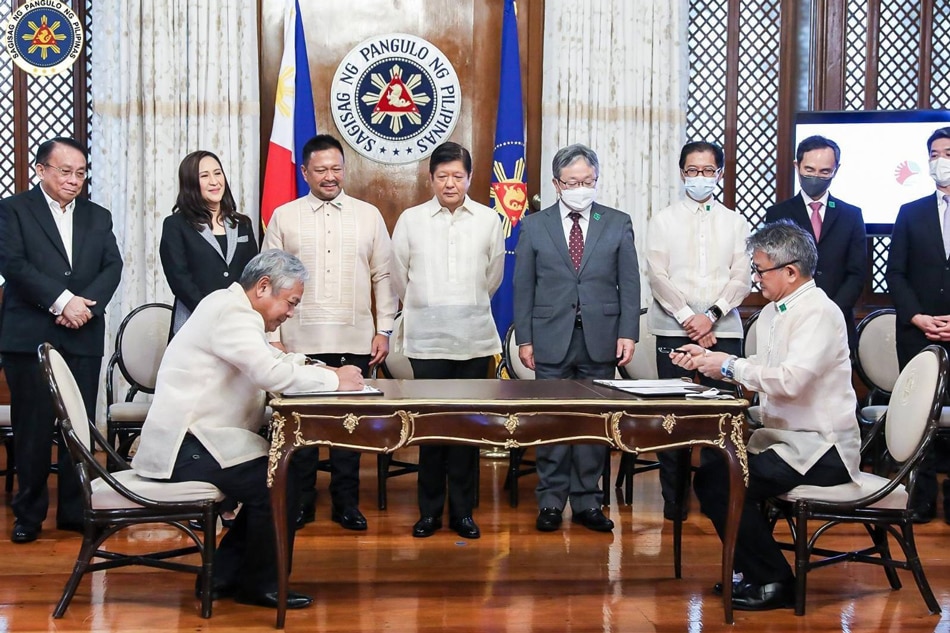2 more contracts signed for Metro Manila Subway Project | ABS-CBN
ADVERTISEMENT

Welcome, Kapamilya! We use cookies to improve your browsing experience. Continuing to use this site means you agree to our use of cookies. Tell me more!
2 more contracts signed for Metro Manila Subway Project
2 more contracts signed for Metro Manila Subway Project
Raffy Cabristante,
ABS-CBN News
Published Nov 03, 2022 06:23 PM PHT
MANILA — The Philippine government on Thursday formally signed two more contract packages on civil works related to the Metro Manila Subway Project (MMSP).
MANILA — The Philippine government on Thursday formally signed two more contract packages on civil works related to the Metro Manila Subway Project (MMSP).
President Ferdinand Marcos Jr. witnessed the signing of MMSP contract packages 102 and 103 at the Malacañang Palace by Transport Secretary Jaime Bautista.
President Ferdinand Marcos Jr. witnessed the signing of MMSP contract packages 102 and 103 at the Malacañang Palace by Transport Secretary Jaime Bautista.
Contract Package 102, a P21-billion agreement with firms Nishimatsu Construction Co., Ltd. and D.M. Consunji Inc., involves the construction of the MMSP's Quezon Avenue and East Avenue stations, including their connecting tunnels.
Contract Package 102, a P21-billion agreement with firms Nishimatsu Construction Co., Ltd. and D.M. Consunji Inc., involves the construction of the MMSP's Quezon Avenue and East Avenue stations, including their connecting tunnels.
Contract Package 103, another P28-billion agreement with Sumitomo Mitsui Construction Co., Ltd., will enable the construction of the MMSP's Anonas and Camp Aguinaldo stations. The former is expected to connect with the current LRT-2 Anonas station.
Contract Package 103, another P28-billion agreement with Sumitomo Mitsui Construction Co., Ltd., will enable the construction of the MMSP's Anonas and Camp Aguinaldo stations. The former is expected to connect with the current LRT-2 Anonas station.
ADVERTISEMENT
In his speech, Marcos said that the MMSP, once completed, will reduce travel time from Quezon City to the Ninoy Aquino International Airport (NAIA) in Pasay to about 35 to 40 minutes.
In his speech, Marcos said that the MMSP, once completed, will reduce travel time from Quezon City to the Ninoy Aquino International Airport (NAIA) in Pasay to about 35 to 40 minutes.
The MMSP, he said, is aimed at addressing the “terrible stories” about lack of quality time for many Filipinos due to traffic congestion.
The MMSP, he said, is aimed at addressing the “terrible stories” about lack of quality time for many Filipinos due to traffic congestion.
"We will reduce the terrible stories that we hear of people who no longer see their children because they come home at 1:30 in the morning and the children are asleep,” Marcos said.
"We will reduce the terrible stories that we hear of people who no longer see their children because they come home at 1:30 in the morning and the children are asleep,” Marcos said.
"They have to wake up at 4:00 in the morning to get back on the bus to fight with the traffic coming back to work. And that the subway and all our public transport systems will be able to help and to remedy,” he added.
"They have to wake up at 4:00 in the morning to get back on the bus to fight with the traffic coming back to work. And that the subway and all our public transport systems will be able to help and to remedy,” he added.
Marcos said he hopes the MMSP will help "improve quality of life" in Metro Manila.
Marcos said he hopes the MMSP will help "improve quality of life" in Metro Manila.
ADVERTISEMENT
When completed in 2028, the MMSP is expected to carry at least 500,000 passengers daily from Valenzuela City in the north to Parañaque City in the south.
When completed in 2028, the MMSP is expected to carry at least 500,000 passengers daily from Valenzuela City in the north to Parañaque City in the south.
Not only will the project reduce travel time for commuters, Marcos said, but it will also generate more job opportunities for Filipinos.
Not only will the project reduce travel time for commuters, Marcos said, but it will also generate more job opportunities for Filipinos.
He thanked the Japanese government and the Japan International Cooperation Agency (JICA) for their support to the MMSP.
He thanked the Japanese government and the Japan International Cooperation Agency (JICA) for their support to the MMSP.
"The world recognizes Japan for having a very efficient rail transport system, which the Philippines aspires to one day emulate," Marcos said.
"The world recognizes Japan for having a very efficient rail transport system, which the Philippines aspires to one day emulate," Marcos said.
"We owe it to the Filipino people to build major roads and critical infrastructure that will not only spur progress and social change, but also promote interconnectivity, ease traffic, and reduce travel time," the president added.
"We owe it to the Filipino people to build major roads and critical infrastructure that will not only spur progress and social change, but also promote interconnectivity, ease traffic, and reduce travel time," the president added.
ADVERTISEMENT
Marcos assured that the government is also on top of other railway projects to make it a "viable option" for Filipino commuters.
Marcos assured that the government is also on top of other railway projects to make it a "viable option" for Filipino commuters.
Aside from the MMSP, other railway projects in the works include the Metro Rail Transit (MRT)-7, the Light Rail Transit (LRT) -1 Cavite Extension, and the Philippine National Railway (PNR) Clark Phases 1 and 2.
Aside from the MMSP, other railway projects in the works include the Metro Rail Transit (MRT)-7, the Light Rail Transit (LRT) -1 Cavite Extension, and the Philippine National Railway (PNR) Clark Phases 1 and 2.
RELATED VIDEO:
Read More:
MMSP
Metro Manila Subway Project
Ferdinand Marcos Jr.
Jaime Bautista
DOTr
commuting
Metro Manila
transport
subway
subway project
ADVERTISEMENT
ADVERTISEMENT



